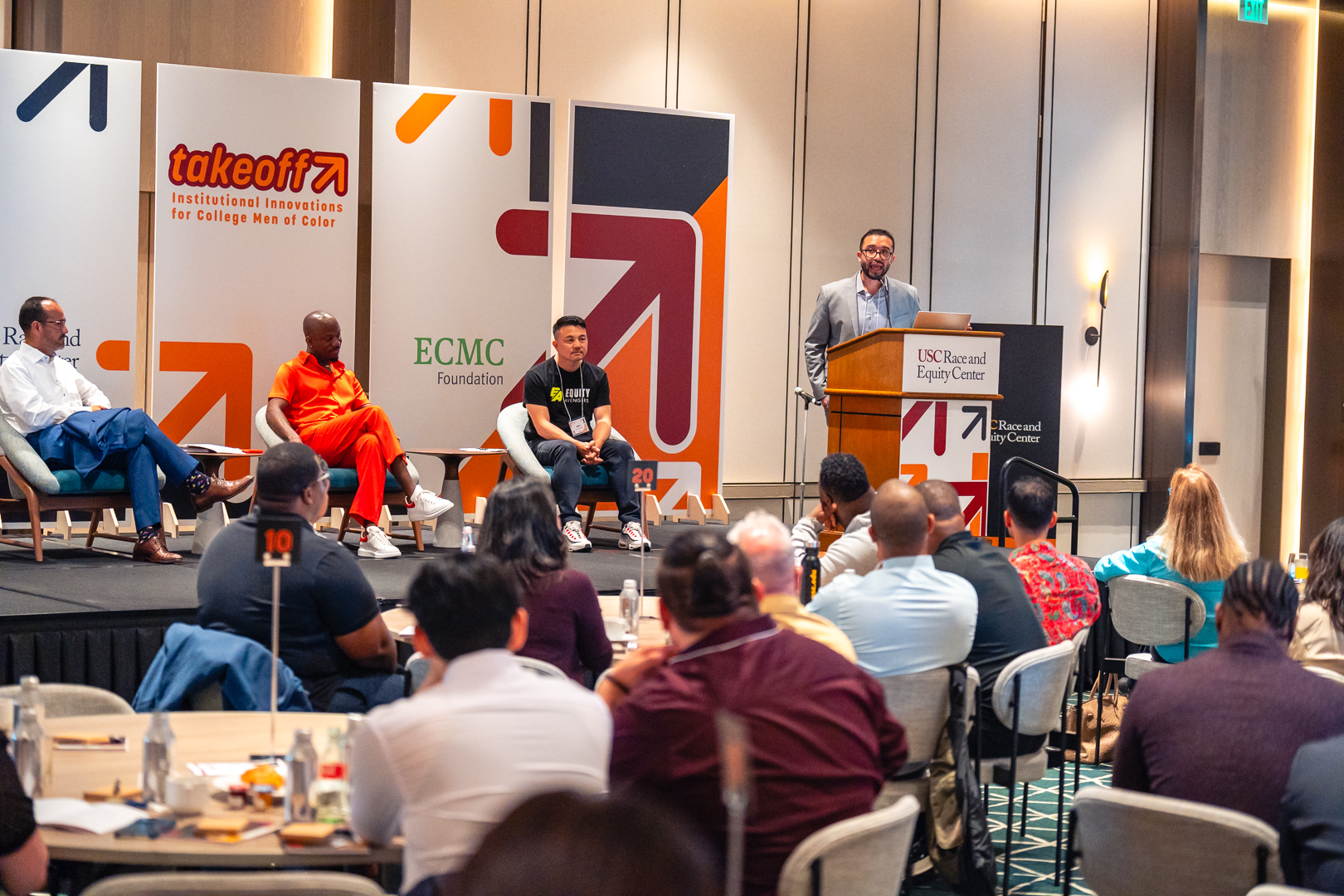Planting the Seed and Watching Innovations for College Men of Color Grow
September 26, 2023

By Saúl Valdez, Senior Program Officer
Last month, ECMC Foundation was pleased to join the kickoff convening for the Men of Color Initiative’s signature project, Takeoff: Institutional Innovations for College Men of Color. With our partners at the USC Race and Equity Center, we welcomed six-member institutional teams from 15 selected community colleges for three days of relationship building, learning from experts in the field and intentional collaboration. The goal is to expand and grow campus-wide ideas to empower males of color to officially take off on their postsecondary journeys in environments designed to bolster their success.
Takeoff began with the vision that is at the center of the Men of Color Initiative—namely, setting the foundation for new practices and possibilities that institutions and systems can leverage to better support male students of color in higher education. To do that, we must strengthen programs and improve academic outcomes for those served, promote culture change across postsecondary institutions and advance field-building efforts that seek to inform and address equity gaps.
This program, with its specific focus on transforming systems and structures at community colleges, will advance 15 actionable strategies designed to support various student groups including Black, Latinx, Southeast Asian and Native American men, as well as institutional designations and programmatic models for the field to consider. The participant teams were chosen from more than 150 applicants across the country to join a peer cohort that will imagine, implement and evaluate strategies to improve the outcomes, experiences and lives of males of color at their respective campuses over the next two academic years. Along the way, they will work with experienced coaches on multi-layered projects ranging from trainings for faculty and staff on how to better support males of color, increase non-academic support systems and apply a rigorous, intentional, human-centered process to investigate their historical contexts and assumptions tied to this work.
For me, this work actualizes both personal and professional aspirations. Growing up in rural Nebraska, I was surrounded by wheat fields and fascinated by how the seemingly endless expanse of them had begun with a seed that fit on the tip of my finger. Today, as a change-driven grantmaker, I’ve never lost that sense of awe or possibility, and I now ask myself daily what we’re growing in the field of postsecondary education.
It’s not a perfect metaphor, but I truly believe we can realize something huge and lasting from a small beginning, with the right set of conditions and the right team behind the work. The combination of those is what makes Takeoff such a special project, and to see the launch event full of so much joy, connectedness, shared learnings and camaraderie was inspiring.
What’s more, the kickoff showed just how important an expansive vision for the long haul is to any project, regardless of scope or size. Here, that means thinking broadly about the myriad ways to help men of color remain engaged and successful in higher education. And even as a male of color and former first-generation student myself, I was struck by the organic kinship that arose from the convening and the unexpected but vital intergenerational support system that has already arisen.
From community college presidents to expert researchers and practitioners, many of the participants have worked in this field for decades and will serve as a wealth of knowledge for the institutional teams. Just as powerful are the student leaders who live these realities every day and who are working to change them.
As Dr. Shaun Harper, the founder and executive director of the USC Race and Equity Center, reminded the institutional teams—and what has indelibly stuck with me in the weeks since the event—the students involved in these projects are the real experts. Male students of color, he reminded attendees, should not be tokenized or seen as observing representatives. Rather, they must be included and considered intentionally in all aspects of the project. Only through this type of student embrace can the field truly reimagine itself.
In the months ahead, the 15 colleges will begin implementing their ideas, particularly in targeting supports to specific groups rather than the all-too-common one-size-fits-all approach to which many campuses default. Along the way, we will build the data and evaluation infrastructure and usage practices to allow the field to better understand and address systemic equity gaps seen at two-year and four-year colleges and universities alike.
Since the kickoff, we have remained beyond excited for all the Takeoff teams to work closely with their coaches in implementing their projects over the course of the next two years. We know that the ideas and solutions that have been planted at the convening will flourish and grow. We’re looking forward to the journey.
The selected colleges that are participating in Takeoff are: Bakersfield College (California); Capital District Educational Opportunity Center, a division of Hudson Valley Community College (New York); Community College of Baltimore County (Maryland); Consumnes River College (California); Edmonds College (Washington); Fullerton College (California); Greenville Technical College (South Carolina); Harry S. Truman College (Illinois); Ilisagvik College (Alaska); Kapi’olani Community College (Hawai’i); Lehigh Carbon College (Pennsylvania); Long Beach City College (California); Northeast Lakeview College (Texas); Phoenix College (Arizona); and San Jose Community College (California).
